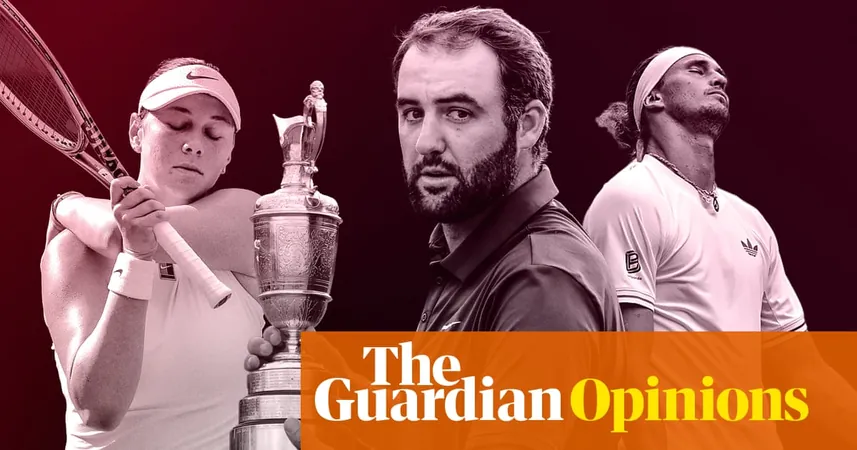
Why Top Athletes Are Searching for Meaning Beyond Trophies
2025-07-21
Author: Ming
The Pursuit of Purpose in Sports
Elite athletes are grappling with profound questions about their motivations. Scottie Scheffler, a golfing superstar, openly pondered why he strives for victory, revealing a common struggle among sports icons. Similarly, world No. 3 tennis star Alexander Zverev shared feelings of emptiness, regardless of his match outcomes. Meanwhile, Amanda Anisimova, the Wimbledon women’s singles runner-up, had to step back from the game to preserve her mental health, returning stronger than expected with a finalist performance.
The Mental Game Beyond Wins and Losses
Today's athletes increasingly realize that their careers extend beyond the tangible achievements of winning or losing. Embracing this broader perspective allows them to pursue their passions without the shackles of pressure or temporary victories. Scheffler himself articulated that while winning offers a fleeting sense of accomplishment, it doesn't equate to enduring fulfillment. He remains curious about the deeper reasons behind his competitive drive.
Reconnecting with Purpose
Anisimova's journey underscores the importance of mental wellness. After recognizing her own burnout, she took a significant break, which was critical for her emotional recovery. Detractors warned that time away could jeopardize her career, but her return triumphantly proved the value of mental health. Similarly, Zverev understands that success in tennis transcends mere match results and is instead tied to deeper, more meaningful experiences.
The Search for Meaning: A Universal Need
This journey to find purpose mirrors fundamental truths found in psychology and philosophy. Figures like Maslow and Viktor Frankl have emphasized the necessity of meaningful pursuits. Scheffler's reflections reveal that while trophies are gratifying, they fail to fulfill deeper emotional cravings. It’s a reminder that victory’s joy is fleeting and should not be the sole anchor for athletes.
Evolving Coaching Perspectives
As the athletic landscape changes, so does the emphasis on mental strength within coaching. Programs aimed at aiding athletes in exploring their identity and purpose are emerging, yet many traditional coaching models still focus on technical skills over emotional and psychological aspects. Organizations like Switch the Play and the True Athlete Project recognize this need for meaningful conversations to occur early in an athlete's career.
Emotions: Bridging Winners and Losers
A powerful shift occurs when athletes develop a strong sense of purpose and connection. Rather than feeling dramatically different based on wins or losses, they perceive both outcomes as opportunities for growth and self-discovery. Recent Wimbledon finalists, Jannik Sinner and Carlos Alcaraz, exemplified this mindset, focusing on gratitude and acceptance rather than just their championship results.
The Bigger Game: Personal Growth
The stories of elite athletes increasingly reflect their desire to evolve as both players and people. Holding the Wimbledon trophy, Sinner encapsulated the essence of this journey: the continuous quest not just to excel in sport, but to become a better individual overall. This holistic approach might just be the secret to achieving that all-important mental edge.



 Brasil (PT)
Brasil (PT)
 Canada (EN)
Canada (EN)
 Chile (ES)
Chile (ES)
 Česko (CS)
Česko (CS)
 대한민국 (KO)
대한민국 (KO)
 España (ES)
España (ES)
 France (FR)
France (FR)
 Hong Kong (EN)
Hong Kong (EN)
 Italia (IT)
Italia (IT)
 日本 (JA)
日本 (JA)
 Magyarország (HU)
Magyarország (HU)
 Norge (NO)
Norge (NO)
 Polska (PL)
Polska (PL)
 Schweiz (DE)
Schweiz (DE)
 Singapore (EN)
Singapore (EN)
 Sverige (SV)
Sverige (SV)
 Suomi (FI)
Suomi (FI)
 Türkiye (TR)
Türkiye (TR)
 الإمارات العربية المتحدة (AR)
الإمارات العربية المتحدة (AR)